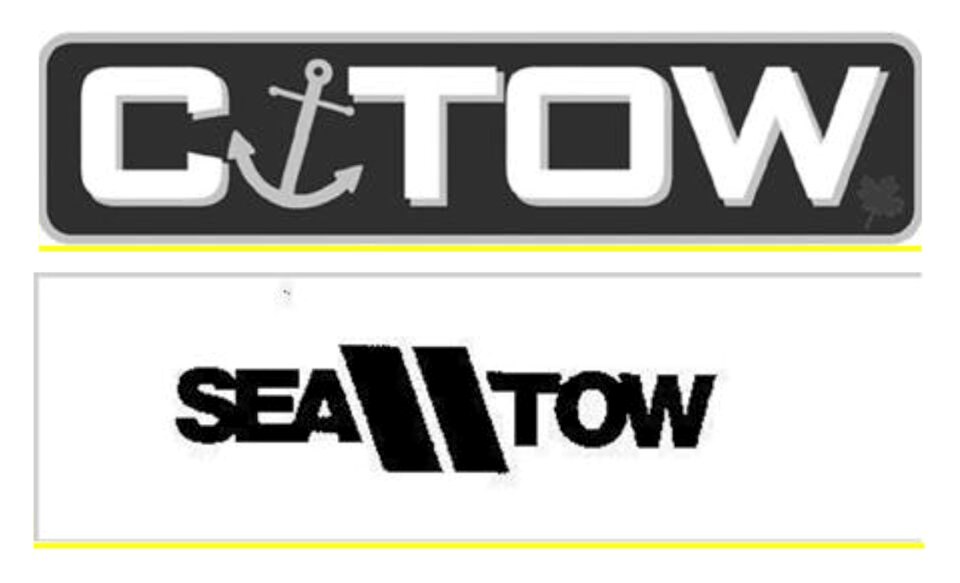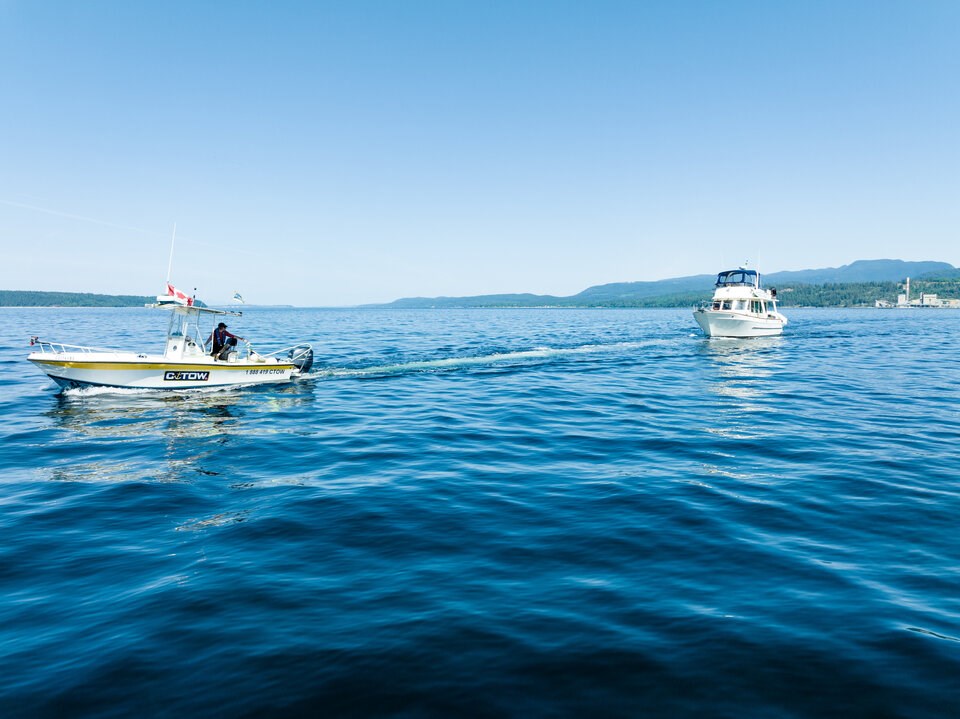Your boat breaks down. Who do you call? Sea Tow or is it C-Tow?
In a series of federal court proceedings, two companies — one from New York, the other from British Columbia — filed claim and counterclaim over the last three years, each alleging they held the rightful trademark over business logos bearing “confusingly similar” names.
Incorporated in the State of New York in 1983, Sea Tow Services International Inc., runs a pre-paid membership model that offers recreational boaters a number of services, including towing, fuel delivery and repairs.
C-Tow Marine Assistance Ltd., meanwhile, claimed the company and its corporate predecessors have done essentially the same thing in B.C. since 1984. Today, C-Tow offers its services in coastal waters spanning Seattle to northern Vancouver Island, as well as parts of Ontario, Newfoundland and Labrador, and the Turks and Caicos.
In April 2022, the B.C. company filed a notice of application seeking an order to strike Sea Tow’s marks from Canada’s Register of Trademarks. A week later, the U.S. company filed a statement of claim against C-Tow, claiming it infringed on its trademark logo.
The U.S. company’s logo includes two words “Sea” and “Tow” divided by two diagonal lines, while the B.C. competitor separates “C” and “Tow” with the image of an anchor.

Sea Tow first attempted to register its word and design trademark in Canada in 2002, and after a number of delays, was eventually successful in 2014. Over the next three years, the Sea Tow trademark faced cancellation for non-use.
Meanwhile, in 2015, C-Tow filed its own applications to trademark its logo, but faced hurdles when it learned the U.S. company had moved to trademark its logo ahead of time.
To win in court, the B.C.-based company was required to show that its U.S. competitor moved to register its trademark while already having knowledge of C-Tow’s previous logo use.
B.C. company leans on corporate documents, longtime boater community
Despite its re-incorporation under a different name in 2006, C-Tow argued it was a successor to the company’s logo. It relied on corporate records going back to the 1980s, records Sea Tow attempted but ultimately failed to have ruled inadmissible at a July 2024 hearing.
C-Tow also brought in several witnesses.
Longtime customer Peter Longhi said a work boat painted with the C-Tow trademark on the cabin or hull helped him twice in the 1990s. Over the past 15 years, he said he’d received membership packages, renewal forms and a plastic key fob bearing the C-Tow logo.
Bruce Falkins, who for 39 years has owned a fuel station at Fisherman’s Cove in West Vancouver, said the boat-towing company was already up and running on Vancouver Island in 1985 when one of the original owners set up shop on Bowen Island.
C-Tow’s logo could soon be seen on an 18-foot zodiac, and in advertisements at the fuel station and other businesses around Vancouver and the Howe Sound area, Falkins said.
Falkins’ fuel station even hosted an advertisement for the company displaying its VHF radio call sign: “CTOW CTOW CTOW.”
At the time, Falkins told the court the company was the equivalent of the “auto club of the sea.”
U.S. competitor's evidence falls short
The U.S. company, for its part, said it first attempted to make use of its logo in Canada in July 1984. At the time, Sea Tow’s then co-owner described the company to a New York Times reporter as “Triple-A of the sea” with memberships in its first year of operation ranging from an annual $85-100.
But in his original Jan. 6, 2025, ruling, Federal Justice Richard F. Southcott said Sea Tow provided no evidence that the publication of the company in the U.S. — as well as its website and presence at a handful of boat shows — made it a well-known entity in Canada.
The judge also pointed to affidavits and statements from people in the B.C. boating industry that said they had never seen Sea Tow boats in B.C. waters, never heard a Sea Tow boat on the VHF, and never seen advertisements for the company in B.C.
Sea Tow, on the other hand, presented an affidavit from a boat captain that claimed it had several U.S.-based franchisees that operated in areas within the Great Lakes, as well as in Lake St. Clair and the Detroit River — areas of operation that included Canadian waters.
Boaters in Canadian waters would have ordinarily received radio broadcasts of “SEA TOW, SEA TOW, SEA TOW” when U.S. members called for assistance, the affidavit said.
The judge found the evidence in the affidavit only reached back as far as 1986 — after the B.C. company C-Tow had established its use of its logo in Canada.
C-Tow to recoup 40 per cent of legal fees
Under new ownership, the B.C. company started setting up booths at boat shows in Vancouver and Victoria in 2006 to attract new members. That effort appears to have paid off.
Southcott’s decision redacts C-Tow’s revenue in recent years, but notes that the company reports it has grown 25-fold since 2007, with its membership now “more than an order of magnitude larger” than Sea Tow’s Canadian members.
Despite Sea Tow’s attempts to unravel the B.C. company’s history (it even hired a private investigator), Southcott found the U.S.-based company knew about its Canadian competitor’s previous use of the logo. The judge found C-Tow is the ultimate successor of the trademark logo going back to 1985.
Southcott, however, rejected C-Tow’s allegation that the U.S.-based company acted in bad faith.
In a Feb. 20 ruling, the judge ordered the U.S. company to pay C-Tow 40 per cent, or $412,000, of the $1 million in legal fees it racked up during the trademark dispute.
C-Tow declined a request for comment, citing ongoing litigation.
Federal court records show the U.S. company has appealed the ruling.



